| Reviews & Columns |
|
Reviews DVD TV on DVD Blu-ray 4K UHD International DVDs In Theaters Reviews by Studio Video Games Features Collector Series DVDs Easter Egg Database Interviews DVD Talk Radio Feature Articles Columns Anime Talk DVD Savant Horror DVDs The M.O.D. Squad Art House HD Talk Silent DVD
|
DVD Talk Forum |
|
|
| Resources |
|
DVD Price Search Customer Service #'s RCE Info Links |
|
Columns
|
|
|
My Perestroika
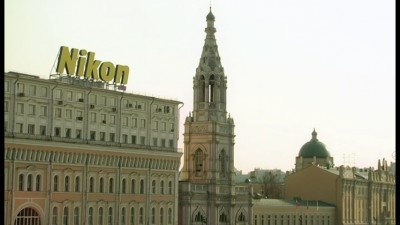
One of the subjects of Robin Hessman's My Perestroika -- a documentary that follows members of the now middle-aged group of people who were the last generation of Russians to come of age behind the Iron Curtain -- is a present-day Russian child called Mark, who, upon being asked by the filmmaker about the Cold War, looks up from his seemingly simultaneous iPod, TV, and computer screen navigations to tell the camera that they haven't yet covered that in school. Mark is about nine or 10, and his parents -- more at the center of the film than their son -- are history teachers at the same local public school in Moscow that Mark attends, where they also went to learn (rather different lessons) when they were schoolchildren. The differences between Mark and his parents, Borya and Lyuba -- a close-knit, harried, very loving, progressive family unit -- are nicely emblematic of what the film is about, since Mark is strictly post Cold War and wouldn't recognize a Moscow without a sky full of billboards and a Pizza Hut readily available, whereas his parents lived through the dying days (decades, really) of the Soviet Union's blanket of scarcity, obligatory lip-service to "the Party," Pravda, and officious, hollow pieties. The film doesn't stop just at how radically different Mark's life is from that of his parents, though; Hessman digs deeper and expands further out to show that the experiences and impressions of his parents and their peers, despite their having grown up in an era of surface conformist uniformity, were hardly monolithic. The film takes us back to Borya and Lyuba's class at school #57 and gathers, along with their testimony, that of three of their classmates, setting them alongside each other for an extraordinarily up-close, detailed, and personal view of five tiny but vital tiles in the mosaic of one of the pivotal, definitive historical events of the 20th century, the one that carefree young Mark has yet to learn all about: the 1991 collapse of the Soviet Union and the dawning of mixed-blessing Western democracy and capitalism in what had long been a stagnant, stale, hypocritically sloganeering (and, as everyone later found out, failing) bureaucracy.
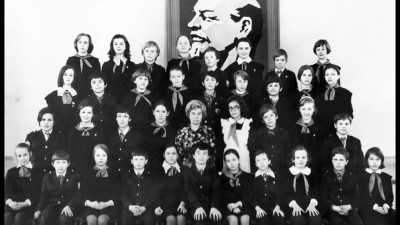
Hessman starts us off in the quotidian present, with an ordinary day in the life of Mark, Lyuba, and Borya in their Moscow flat, cut in with the everyday of the past in the form of super-8 footage of Soviet families going about regular activities in the late '70s. The quality of the super-8 lends a near-nostalgic, long-ago quality to the bygone time, which appears spare but peaceful, somehow idyllic, "different" from what most Westerners would recognize, whereas the present-day life of the family appears, despite the somewhat overcrowded feel of their flat (which was Borya's family's and where he himself grew up), like a very familiar "modern family" (if not quite a Modern Family), with two work-worn, bemused parents and a precocious, tech-savvy, sometimes smart-alecky but good-natured kid. But Borya has better access than most to that world that started to fade when the Berlin Wall fell; his father was one of the privileged few who had possession of a super-8 camera and was an obsessive diarist of his family's doings, resulting in a treasure trove of footage of Borya at all ages along with some of his ex-schoolmates, including Olga, who now works for a billiard-table rental firm; Andrei, now an entrepreneur who has attained the Russian franchise of an upscale French men's apparel chain; and Ruslan, a self-described "outsider" who busks for a living after having been one of the leading lights of a punk-rock scene that thrived in the liberating cultural upheavals leading up to and in the wake of the '91 coup that officially split the former union of 15 Soviet Socialist Republics into virtually as many independent nations. Nimbly collaging together Borya's father's privately made-and-motivated (and therefore quite "true" and convincing) home movies; present-day, in-depth interviews with the former classmates at home and on their respective jobs; and Soviet cine-propaganda from various late '70s to early and mid-'80s campaigns (lots of instructionals on safety during a U.S.-instigated nuclear attack; recitations of Communist heroism; and huge, eerily beautiful crowds of schoolchildren in perfect formation, singing hymns to the motherland), Hessman and editors Alla Kovgan and Garret Savage create an intuitively well-organized montage (well-considered and -structured, but it flows) that comes remarkably close to capturing, cinematically, the teeming, inscrutable, impossibly shapeless movement of history that involves the disparate needs, desires, temperaments, experiences, and memories of all those "anonymous" individuals who become indistinguishable from the faceless mass when we look at history through the usual long view -- people whose concerns much more likely match our own than do those of a Brezhnev, Reagan, or Gorbachev.
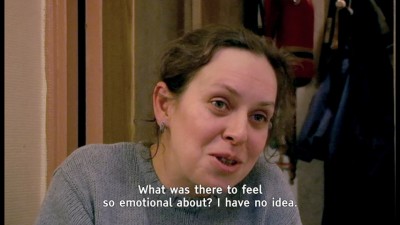
So we learn from Hessman's interviewees/subjects that, of course, both U.S. and Soviet official versions were so much overblown exaggeration, and any average Russian, like any average American, was likely to be very wary of the nationalistic narrative and more worried about paying the bills and making their way than adhering to a certain politics or ideology. Lyuba, Mark's mother and Borya's wife, singles herself out as an exception to this, sort of stealing the show with her onscreen recollections -- as ingeniously articulated and self-deprecating as stand-up comic material (she's an especially charismatic storyteller, even among this lot of mostly verbally forthcoming folks) -- as a very dutiful "conformist" who was very late to get on board when perestroika (restructuring) became the new way after the 1982 death of Soviet Communist Party General Secretary (i.e., President) Leonid Brezhnev, whose pompous, overblown funeral processions (which we see parodied in some footage from the time by some typical specimens of the new, bold, insouciant Russian youth) gave way to Mikhail Gorbachev's thaw and a new openness that would eventually lead to the end of the longstanding Soviet way of life. But perhaps that that would have happened anyway, given the new breed of authority-questioning, wised-up, idealistic-if-naive Russian youth that dared to mock Brezhnev's funeral: unlike his future wife, Borya and, especially, prescient punk-rocker Ruslan embraced the U.S. and anything non- or anti-Soviet and rejected the outmoded pleasantries, slogans, and hamfistedly see-through propaganda of their immediate environment. This was, in the grown-up Borya's memory, not much more than a commonplace teenage rejection of the status quo, starry-eyed romanticism, failing to take into account the imperfections that existed elsewhere, too, not just in the Soviet Union (imperfections that, in a contemporary Russian consumer-capitalist speedway-culture in thrall to money-measured Americanism, are now all too apparent); but however inchoate, they were involved and eager for change, as was, later, Lyuba, who was drawn in and won over by the nonconformity of the handsome, sleepy-eyed Borya we see as a young man in his father's films.
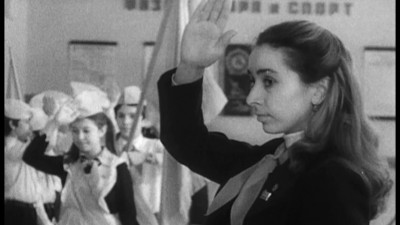
For Olga and Andrei's part, neither were self-consciously either nonconformist, ideological, or even very aware or interested one way or another; unlike Ruslan, Olga, and Borya, all of whom were there when the crowds gathered to protest a military crackdown and support/celebrate Boris Yeltsin's successful '91 dissolution of the USSR, they were simply away on vacation, not necessarily seeing the nobility of a bunch of people looking, as Andrei sees it, for an excuse to drink, go wild, and finally get something to eat in an economically unsteady, ration-couponed world. They simply were automatically put, as was every Soviet child, onto the slowly sinking ship of supposed eternal, benevolent Party rule and stayed on it, making their way and getting by as best they could -- Olga as a Komsomol (Young Communist League) leader in her school, Andrei in the Soviet Army -- until it was time for everyone to jump off into the "free" waters of multiple political parties, free enterprise, and private ownership. These differences in personality and worldview survived the turbulent ebb and flow of history; Ruslan, Lyuba, and Borya remain close, each engaged after their own fashion with the world around them (the perceptive awareness and intelligence of their casual conversation, alone and together, is enviable) if rather disillusioned by a Westernized Russian culture where children seem not to read and, especially, by the racist, violent, widespread nationalism and the rise of right-wing Russian President Vladimir Putin that rushed into the unstable political vacuum left when Yeltsin, a onetime heroic figure whose real worth they now question, was figurehead to that '91 coup. Olga and Andrei, for their part, are apolitical (Olga invokes the term explicitly): Olga has seen a fading of her fortunes, whereas Andrei has attained a previously unthinkable level of prosperity. While Ruslan, Borya, and Lyuba continue to seek some reasonable continuity between the Soviet Union they grew up in and the Russia of today (and each has some cogent things to say as they do so), Olga and Andrew each encapsulate a different side of the irrevocable breaking away from the old way of life and embrace of a new one -- left to luck and one's own devices, for better or worse, and with variable results -- that would have been unimaginable in the world where they grew up. It is in the discrepancies between these divergent, fascinating viewpoints and recollections -- especially in their wildly differing accounts of the '91 "revolution," which range from sincerely emotional to contemptuously dismissive -- that this continuously unexpected, rewarding film is at its deepest and, paradoxically, most illuminating, if only to shine a clear light on the fact that subjectivity and uncertainty, not pat, definitive summations, are truer to history as it is really lived and felt.
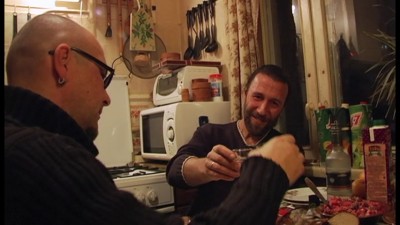
Meanwhile, little Mark attends the school (now with terrorism warnings/information decking the walls that once displayed placards describing what to do in case of a U.S.-instigated nuclear attack) where his parents, while going about their history-teaching duties, do a little bit every day for their students of the same thing they've been doing for us throughout the film: giving honest eyewitness testimony to a history that's easy to oversimplify. It is here that Hessman closes her film, which is already packed with conscientious, inspired montage that's both historically provocative and aesthetically on the mark (her use of music is particularly refreshing -- no original score, just real Russian music of the prescribed-folk and contraband-pop variety, with a dash of Arvo Pärt), creating through editing some fine-tuned, well-earned final moments exemplifying endurance through even seismic cultural, social, and political shifts: these ending shots capture the September 1, 2011, first day of school ritual (always a big event in Russia), with Borya and Lyuba receiving the traditional flowers presented to teachers by their new students, intercutting it with footage (taken, of course, by Borya's father) of Borya's graduating class during the same ritual decades earlier, with a graduating student -- Borya himself, in this case -- holding a new student aloft to ring the bell that heralds the commencement of the new school year. It's a symbolic act of continuity, the passing on of the baton from one student at the end of an adventure to another just beginning it at a school that existed before the Russian Revolution and continues to exist after that revolution's ultimate failure. The thread of history may zigzag and tangle, but it takes more than a revolution -- or even a further revolution to break the hold of the stagnated previous one -- to sever it entirely.
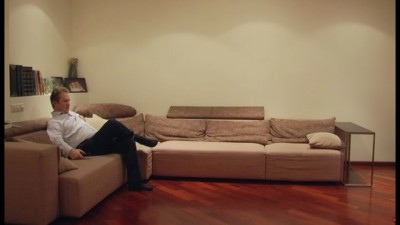
THE DVD:
Presented anamorphically in the 1.66:1 aspect ratio, My Perestroika retains all the true, variously "flawed" (other than the clear, clean present-day digital video) visual textures of archival Russian TV news video, 16 mm propaganda/documentary footage, and the lovely grain of 8 mm home movies, all to very nice effect; no compression artifacts were noted.
Sound:Both of the disc's audio options -- Dolby Digital 5.1 surround and Dolby Digital 2.0 stereo, in Russian with (non-optional) English subtitles -- offer clear, fully dimensional soundtracks, without distortion or imbalance. The choice is straightforward: more concentrated 2.0 sound for regular TV/front speakers only, more widely dispersed 5.1 sound for setups with rear speakers.
Extras:--Sixty minutes of deleted scenes, many of which must have been difficult to pare off as it's all still relevant and interesting, which make for a fine supplement to the main feature, with sections divided by theme (on topics ranging from serious -- the Cold War, the "return of the names" of those murdered by Stalin during his reign of terror -- to the more purely social, like sex in the Soviet Union, rock in the Soviet Union, etc.). Most of this is excerpted and well-integrated into the feature, but it's substantial, pertinent stuff, and it's nice to be able to enjoy it in further, more relaxed detail if you're so inclined.
--Two interviews with director Robin Hessman: One for a PBS station as an introduction to the airing of My Perestroika as part of their POV series, and another for a Russian-language program (non-subtitled, unfortunately) out of Toronto called Russian Waves. The latter -- done in the style of news-program arts coverage -- will be understood only by those who speak Russian, though it does demonstrate Hessman's awesome proficiency in that tongue, which must have gone a long way toward her success in the day-to-day of making the film. The POV interview reveals Hessman to have been a citizen of the world from a very young age, with a longstanding fascination for Russia both during and after the Soviet era that led her to live and study in Moscow for many years (at one point becoming the producer of the Russian Sesame Street). It's a brief promotional interview, but surprisingly rich in background and context for the film, and well worth a look.
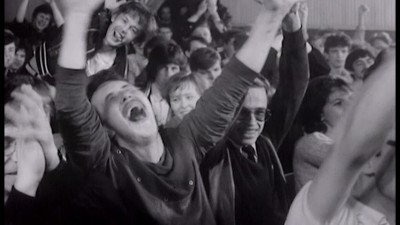
Robin Hessman's engrossing, thoughtful, humane My Perestroika tracks history down at the level where it most easily gets lost: the individual, day-to-day dimension where Big World Events and the need to get to work on time, study for a test, or do the laundry collide. She and her subjects give us the rich, detailed, and diverse (each of them has their own, sometimes contradictory POV) gift of actual, firsthand memories of something most of us saw only from the outside, the collapse of the former Soviet Union, creating a picture much more nuanced than the series of sound bites and iconic, photogenic moments that that event became in our news media, reminding us in the process that what seemed like victory and freedom at the end of the Cold War was a hardly-smooth transition that continued long after the thrill of the definitive moment passed, and continues still. So much of what we learn as history, even when it's made to "come alive" in the movies, is by necessity a reduction and compression of life-altering events into facts and dates so that we can try to grasp and make some sense of them; what a treat, then, that My Perestroika gracefully frees itself from the obligation to sum things up, instead letting stories be told that complicate and expand our perhaps too-tidy view of things that happened to other people, at some other place and time. It's a superior kind of documentary: it goes beyond merely conveying useful, enlightening, "educational" information, to truly, enjoyably deepen our understanding of the radical change undergone by a world superpower within a single generation by focusing in on some individual, very relatable human faces from that transitional generation. It may be important to understand the abstract, impersonal facts of what happened in that previously closed-off part of the world after the Wall fell, but those big historical movements carried along with them millions of affected lives that were actually lived day to day amid the shifting zeitgeist, which, as Hessman and her wonderful film remind us, are the most basic, compelling reason to be interested in the first place. Highly Recommended.
|
| Popular Reviews |
| Sponsored Links |
|
|
| Sponsored Links |
|
|
| Release List | Reviews | Shop | Newsletter | Forum | DVD Giveaways | Blu-Ray | Advertise |
|
Copyright 2024 DVDTalk.com All Rights Reserved. Legal Info, Privacy Policy, Terms of Use,
Manage Preferences,
Your Privacy Choices | |||||||












